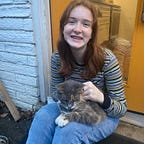Melissa Bonnette, Upper School French
“My French teacher from high school became kind of like a surrogate mother for me. My mom and I did not get along well when I was a junior and senior in high school. Growing up, my family was not touchy-feely. We were all family, and we cared for each other, but it was not emotionally supportive. I got a lot of [emotional support] from my French teacher. There were quite a few days where I would just eat lunch in her room and cry to her about all the stuff that had happened. My rebellion in high school was ‘Fine! I’m going to work!’ I worked at Chick-fil-A, so if my mom made me mad, I would just go to work, and I wouldn’t even clock-in. I would go to work for free, which is actually a labor law violation, sit in the back, and ask them to let me do something.
I had a life-changing personal tragedy at the end of 2019, so in 2020, I was still dealing with that. I had my son in October at 20 weeks, which is about half the gestation period. He lived for about an hour and then he passed, so after that I had to deal with the grief. I thought ‘How do I deal with this?’ I’ve always wanted to be a mom, and he was my first son. Four or five months into my grief journey, COVID hit. I had thrown myself into work. I did all these different kinds of trainings, like perinatal yoga trainings, to learn how to work with women who are pregnant and then after they’ve had their baby. I did a doula training to help me understand the things that had happened during my labor. But I liked being with my students, so it was nice to have something, not necessarily to distract me, but just something to do. When COVID hit, suddenly, all that was gone. All this structure, which I need in order to be a functioning human, was taken away. Starting here has been wonderful, having the structure is nice.
To process things, I tend to pour myself into action. I realize this goes back to my youth with the ‘I’m upset, I’m going to go to work.’ It’s a way of processing through things, but it’s a bit avoidant. What I’ve learned from my own trauma experiences is that some people will avoid [their trauma] completely and other people lean in. For example, Thursday night, I filled out a survey for the miscarriage association in the UK, and they asked such open-ended questions. I had been tapping on what I call ‘the grief button,’ but [the survey] was a nice, big push. It felt good to release it all, so there are some times when it’s good to lean in and there are some times where you just have to sit with it. You’ve just got to figure out which one works for you.”
story by Lucy Adams
